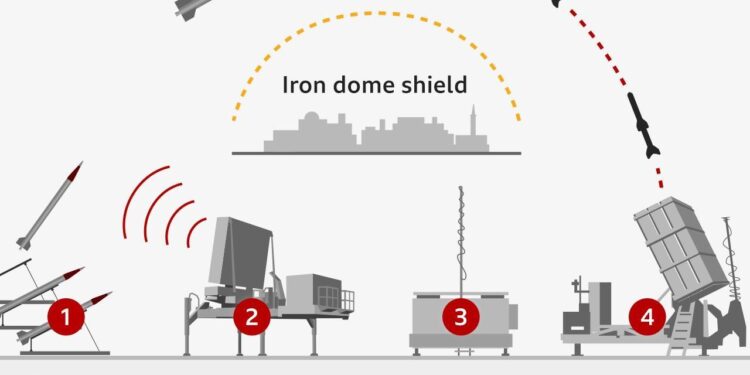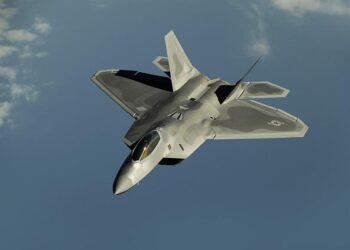Romania is set to make history as the first European country to acquire Israel’s renowned Iron Dome air defence system, marking a significant milestone in the continent’s strategic defence capabilities. The move, announced by key defence industry sources, underscores Romania’s commitment to bolstering its aerial defence amid rising security challenges in the region. As tensions persist across Europe, the deployment of the Iron Dome will enhance Romania’s ability to intercept and neutralize incoming threats, positioning the country at the forefront of advanced missile defence technology.
Romania Sets a New Benchmark with Acquisition of Iron Dome Air Defence System
Romania has taken a significant stride in enhancing its national security by becoming the first European nation to procure the Iron Dome air defence system. This acquisition marks a pivotal moment for the country’s military capabilities, aligning it with leading-edge technology designed to intercept short-range rockets and artillery shells. The system’s proven effectiveness in complex threat environments promises to fortify Romania’s defensive posture amid evolving geopolitical tensions in the region. Officials highlight the strategic importance of this move as not only a deterrent but also a force multiplier for joint NATO operations.
Integrating the Iron Dome will introduce several advanced features to Romania’s air defence network, including:
- Rapid interception capabilities against a variety of aerial threats
- High accuracy in tracking and neutralizing incoming projectiles
- Modular deployment suited for both urban and battlefield environments
- Seamless integration with current NATO command and control systems
Below is a brief comparison that outlines the technical edge Romania gains with this system over traditional air defence solutions:
| Capability | Traditional Systems | Iron Dome |
|---|---|---|
| Interception Range | Up to 20 km | Up to 70 km |
| Reaction Time | Several seconds | Under a second |
| Threat Types | Limited (mainly aircraft) | Varied (rockets, artillery, mortar shells) |
| Mobility | Fixed installations | Mobile and deployable |
Strategic Implications for European Security and Regional Stability
The integration of the Iron Dome air defence system into Romania’s military arsenal marks a significant shift in the balance of power within Eastern Europe. As the first European nation to acquire this advanced Israeli technology, Romania not only elevates its own defensive capacities but also sets a precedent for NATO allies seeking to modernize their air defence frameworks. This move reflects a proactive approach to countering emerging aerial threats, particularly in light of recent geopolitical tensions and increased missile activity in the Black Sea region.
Key strategic implications include:
- Enhanced deterrence: The system’s proven effectiveness against short-range rockets and missiles acts as a force multiplier for regional security.
- Strengthened NATO interoperability: Romania’s adoption encourages closer cooperation and joint defense drills involving Iron Dome-equipped units.
- Regional stability boost: Improved air defence capabilities contribute to reducing the risk of accidental escalation amid ongoing conflicts nearby.
| Factor | Impact |
|---|---|
| Missile Defense Coverage | Significant reduction in civilian and military vulnerabilities |
| Signal to Adversaries | Demonstrates strategic resolve and technological edge |
| Regional Alliance Dynamics | Enhances trust and burden-sharing within Eastern NATO members |
Beyond Romania’s borders, this acquisition disrupts traditional defence paradigms and prompts neighboring countries to reconsider their own air defence postures. The move could ignite a ripple effect that revitalizes European missile defense collaboration, aligning with wider efforts to fortify the continent The integration of Israel’s Iron Dome air defence system into Romania’s military structure represents a pivotal development in Eastern Europe’s security landscape. Romania’s status as the first European nation to deploy this advanced technology signals a move towards enhanced missile defense capabilities within NATO, directly addressing the rising aerial threats in the Black Sea vicinity.
Strategic Analysis:
- Enhanced Deterrence:
Iron Dome’s capability to intercept short-range rockets and missiles significantly strengthens Romania’s defensive shield, thereby serving as a robust deterrent against potential aerial attacks. This capability reduces vulnerability for both civilian populations and critical military infrastructure.
- NATO Interoperability:
Romania’s adoption of Iron Dome paves the way for tighter integration within NATO forces. Joint training and coordinated operations involving Iron Dome units boost alliance cohesion and operational effectiveness, particularly at a time when NATO seeks to reinforce its eastern flank.
- Regional Stability:
By augmenting air defence capacity, Romania contributes to mitigating risks of accidental escalation in a geopolitically sensitive region. The system’s presence discourages rash offensive actions and fosters an environment where diplomatic solutions can be pursued more securely.
Broader Implications:
- The acquisition sets a precedent for other European nations to upgrade their missile defense systems, potentially catalyzing a regional arms modernization wave focused on advanced interception technologies.
- It sends a clear strategic message to adversaries regarding Romania’s commitment and technological edge in defense, which could alter the tactical calculus of hostile actors in the region.
- Strengthened alliance dynamics, particularly among Eastern European NATO members, promote burden-sharing and collective defense readiness, enhancing the alliance’s overall deterrence posture.
Conclusion:
Romania’s deployment of the Iron Dome system marks a transformative step in Eastern European military defense, reinforcing both national security and NATO’s collective capabilities. As neighboring states observe this move, it may initiate broader cooperation and modernization efforts, ultimately bolstering European missile defense architecture amidst an evolving threat environment.
Recommendations for Integration and Future Collaborative Defence Initiatives
To maximize the strategic benefits of the Iron Dome system, it is essential that Romania pursues full integration with existing NATO air defence frameworks. This will enable seamless interoperability with allied forces, enhancing collective response capabilities across the region. Priority should be given to joint training exercises and shared intelligence platforms, which will foster operational synergy and accelerate proficiency among Romanian operators. Additionally, establishing a dedicated command-and-control interface aligned with NATO’s protocols will ensure real-time data exchange and coordinated threat neutralization.
Future collaborative defence initiatives could include:
- Development of a regional missile defence network incorporating Iron Dome units and partner systems
- Multinational R&D programs targeting next-generation counter-rocket technologies
- Regular multinational drills focusing on integrated air and missile defence (IAMD)
- Creation of a joint rapid reaction force equipped with interoperable missile defence assets
| Initiative | Objective | Timeline |
|---|---|---|
| Integrated Air Defence Network | Real-time multi-source threat tracking | 2025-2027 |
| Joint Training Exercises | Enhanced operational interoperability | Ongoing |
| Collaborative R&D Programs | Innovation in missile defence tech | 2024-2030 |
Final Thoughts
Romania’s move to acquire the Iron Dome air defence system marks a significant milestone in European defence collaboration, positioning the country at the forefront of advanced missile interception technology on the continent. As security challenges continue to evolve, this acquisition underscores Romania’s commitment to bolstering its national defence capabilities while enhancing regional stability. Observers will be closely watching how the integration of Iron Dome influences both Romania’s strategic posture and broader European security dynamics in the coming years.
















